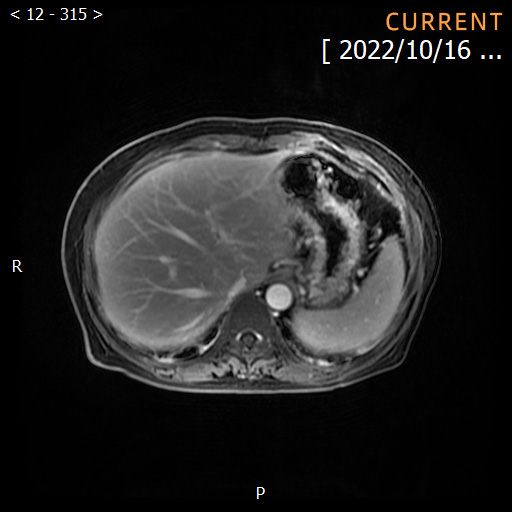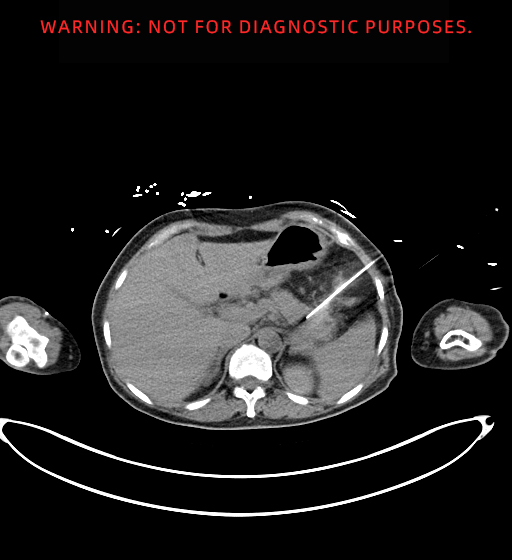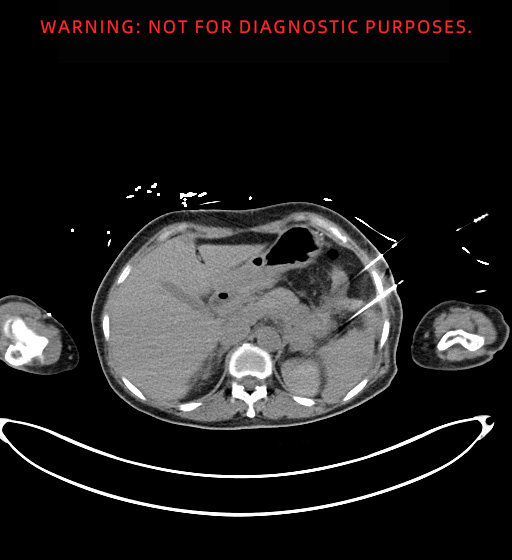

On October 9, 2022, Dr. Zhang Fan's team from the Pancreatic Surgery Department of Binzhou Medical University Affiliated Hospital in Shandong Province carried out an additional surgery for pancreatic tumors using the latest NanoKnife tumor ablation technology. With the guidance of CT puncture, they successfully completed the ablation treatment for a patient with malignant solid pancreatic tumor. The surgery used the High Voltage Steep Pulse Minimally Invasive Therapeutic System independently developed and produced by Shanghai Yuanshan Medical Technology Co., Ltd. (hereinafter referred to as "Alpmed").
The patient is a 60-year-old female who was admitted to the hospital about 3 months ago with complaints of abdominal distension and left upper abdominal pain lasting for over 2 months. She underwent laparoscopic pancreatic tumor tissue biopsy and abdominal wall metastatic nodule biopsy, which confirmed the diagnosis of pancreatic cancer. Based on her medical history, pancreatic cancer with abdominal metastasis is suspected.
Dr. Zhang Fan, head of the pancreatic surgery department at Binzhou Medical University Affiliated Hospital, led a team to consult on the patient's case and concluded that the patient's upper abdominal MRI showed thickening and irregular shape of the pancreatic body and tail, with slightly high signal on DWI and decreased ADC signal. The cross-section was large with unclear borders and a blurred fat gap around it. The lesion near the pancreatic duct was slightly dilated, encircling the splenic artery, with narrow lumens and enlarged lymph nodes visible at the periphery. A nodular lesion was also observed in the left adrenal gland area with unclear boundaries from the pancreatic lesion. Conventional surgery would pose an extremely high risk in this case. However, NanoKnife ablation technology can accurately kill tumor cells without damaging the pancreatic duct and surrounding large blood vessels based on the shape of the tumor, resulting in a higher success rate. On October 9th, Dr. Zhang Fan and his team successfully performed NanoKnife ablation surgery on the patient.

(Preoperative MRI )
The patient was placed in a supine position and underwent four-needle ablation. Diamond-shaped needles were placed around the tumor, with a needle tip exposure length of 1.5cm. The needles were inserted gradually, and the puncture needle position was determined by dynamic CT scanning. After confirming the puncture needle position, pancreatic tumor ablation was performed (5 sets, 100 pulses per set, voltage 2800V, 70us, 30A-45A). The ablation needle was withdrawn by 1.0cm, and pancreatic tumor ablation was performed again (5 sets, 100 pulses per set, voltage 2800V, 70us, 30A-45A). The puncture needle was then removed, and CT enhanced scanning was performed. No fluid accumulation was observed in the abdominal cavity, and the pancreatic tumor showed low density with gasification around it. The ablation was completed successfully.


(Intraoperative needle placement diagram)


Postoperative symptomatic supportive treatment was given, and the patient recovered well. After regular follow-up examinations, no obvious abnormalities were found.

(One week postoperative MRI.)
Director Zhang Fan stated that the ablation surgery went very smoothly, and highly praised the stable energy field and electrocardiogram synchronous monitoring function of the Ailuoyi steep pulse minimally invasive treatment system used in this treatment. Currently, some head medical centers in China have gradually applied steep pulse ablation technology to clinical practice. It is hoped that more and more doctors will pay attention to the application of nanoknife in the field of malignant tumor treatment, and create new opportunities for cancer patients.

|
Zhang Fan Associate Chief of Hepatobiliary and Pancreatic Surgery Department, Affiliated Hospital of Binzhou Medical University. Chief Physician Primary academic appointment Senior visiting scholar at the Cleveland Medical Center in the United States. He has been working in the forefront of general surgery clinical work for nearly 20 years, specializing in standardized diagnosis and treatment of liver, gallbladder, pancreas, and spleen diseases, complex abdominal trauma treatment, complex intestinal fistula treatment, and clinical nutrition support technology. In 2016-2017, he went to the Shanghai Eastern Hepatobiliary Surgery Hospital for further study and is now focusing on minimally invasive treatment of liver, gallbladder, and pancreatic diseases. He was the first to perform laparoscopic choledochojejunostomy, laparoscopic right hepatectomy, laparoscopic caudate lobe resection, laparoscopic pancreaticoduodenectomy with preservation of the duodenum, laparoscopic local resection of the papilla of Vater, single-port laparoscopic cholecystoenterostomy, and single-port laparoscopic left lateral hepatectomy and other minimally invasive surgeries in the hospital. He has won multiple awards for new technologies and projects at the affiliated hospital of Binzhou Medical University. He has also been awarded the "Young Talent Award", "Top Ten Physicians", "Excellent Medical Team Leader" and other honorary titles at the affiliated hospital of Binzhou Medical University. Expert consultation hours:all day every Wednesday Hospital address:Binzhou Medical University Affiliated Hospital is located at No. 661, Huanghe Second Road, Binzhou City, Shandong Province. |
The First Medical Center of the General Hospital of the Chinese People's Liberation Army (PLA), led by Prof. Xiao Yueyong, has established the First Medical Center of the PLA General Hospital as the main research unit for the ablation treatment of pancreatic malignant tumors with the Steep Pulse Therapy Instrument (Nano Knife), and the Affiliated Hospital of Binzhou Medical College as the first sub-center!
Binzhou Medical College Hospital was recognized as a tertiary hospital in May 1995, becoming the youngest tertiary general hospital in the country in the first round of review, becoming one of the first seven provincial-level regional medical centers in Shandong Province in December 2015, and the hospital passed a new round of hospital grade review with excellent results in December 2021. Since the establishment of the hospital, it has insisted on medical treatment, teaching and scientific research, and achieved good and rapid development in all undertakings, firmly establishing its status as a medical, teaching, scientific research, rehabilitation and emergency center in the Yellow River Delta region.
With the rapid development of various diagnostic techniques and interventional treatments, the use of NanoKnife will become more and more widespread, providing a new treatment option for patients with locally progressive pancreatic cancer that cannot be surgically resected or is difficult and risky to resect.
Now Binzhou Hospital is recruiting pancreatic cancer patients. For details of recruitment requirements and how to apply, please click the article link below.
↓↓↓
【Patient Recruitment】 Pancreatic Cancer NanoKnife Ablation Clinical Trial